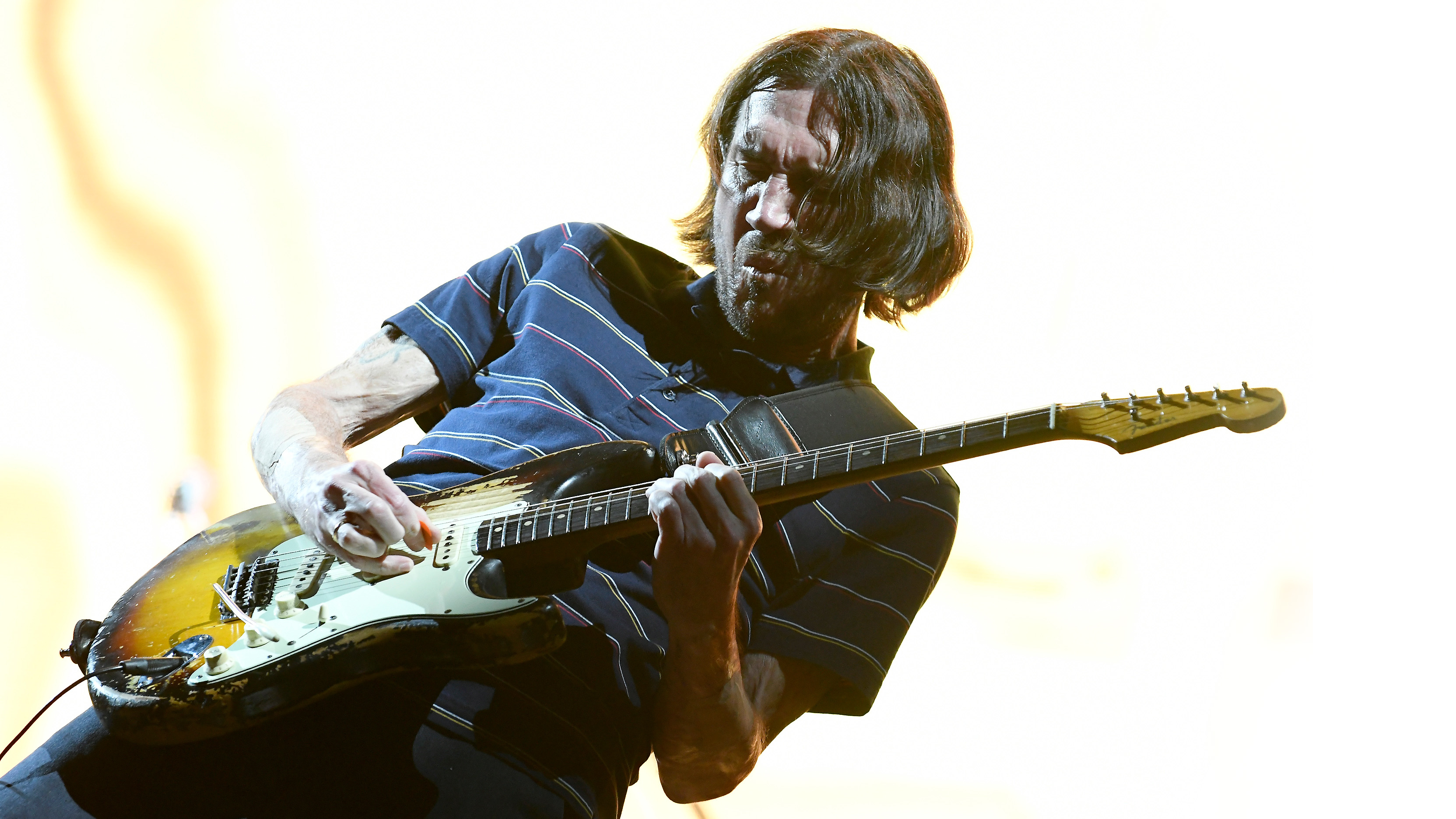
What is a record producer? You will get a different answer according to who you ask, but it's clear Rick Rubin is on the arrangement side of the role – sometimes moving in and out of a band's studio sessions to offer his insight into song structure before an artist even gets to the stage of soundscaping. And it looks like that side of Rubin's talents affected a young John Frusciante's guitar playing in profound way.
"It really comes from trying to figure out what I can do that makes Flea and Chad sound as good as they can," Frusciante tells Guitar Player in its new cover story of his often minimal approach to parts in songs such as Eddie and Shoot Me A Smile from current album Return Of The Dream Canteen, as well as classics such as Scar Tissue, Californication and Otherside from the very late '90s.
”Back in the time of [1989 album] Mother’s Milk, I was trying to fill up more space and it just sounded too busy," Frusciante says of the origins of the shift to the sparser approach he applies to some Red Hot Chili Peppers songs.
"It wasn’t as busy as Flea, but Flea has a way of being busy on the bass that never sounds too busy. It always sounds like he’s doing what he’s doing in support of the song. I felt after making that record that I wasn’t supporting the songs and my bandmates as well as I could have."
That shift began on the follow-up record, when Rubin entered as producer and the results gave the band a global breakthrough.
He came from this hip-hop experience, so he was essentially muting the instruments in certain sections
"Another thing there was that Rick Rubin, when he started producing us at the Blood Sugar time, he kept adding ideas to the arrangements," explains Frusciante. "Like, 'Have no guitar for the first verse,' or, 'Have no bass for the second verse.' He came from this hip-hop experience, so he was essentially muting the instruments in certain sections.
That was inspiring for me, because I was already going in the direction of playing less and seeing how much better that made the band sound as a whole. So I just got to a point where I really saw the musical value of space of all types, whether it’s the distance between one point in the bar line and another point in the bar line, or the distance between two sounds, in terms of using wide intervals or creating a chord out of me playing one note on my guitar and Flea playing one note on his bass. It just seemed to make the band feel more whole. And to be honest, the other guys liked it when I started playing that way, and I felt supported."
Want all the hottest music and gear news, reviews, deals, features and more, direct to your inbox? Sign up here.
Take something like the intro to By The Way or the verses of Otherside: I’m not thinking of my guitar as the centre of it; I’m thinking of my guitar as a portion of it
Frusciante also elaborates on how he uses intervals in his dynamic with Flea so effectively.
"I think a lot of people play guitar a certain way, and it may be because they’re just playing with bass players who play simple root-note bass lines. But because Flea plays in such an interesting way, I think of intervals not only as the relationship between two notes on my instrument but as the relationship between what I’m doing and what he’s doing.
Take something like the intro to By The Way or the verses of Otherside: I’m not thinking of my guitar as the centre of it; I’m thinking of my guitar as a portion of it. I’m thinking of the pitch of Flea’s bass line and the pitch of my guitar. If Flea’s playing a note and I’m playing a note, we’ve got a two-note chord right there. And the interval is the space between that.
"So then it’s like, 'How can I move in a way that’s different from how he’s moving?' If he goes down, maybe I go up. And we start creating different little harmony things where we imply chords without either of us playing the whole chord, that kind of thing. Or there’s things like Scar Tissue, where I’m doing those wide, two-note intervals on my own, but I’m really thinking of it as two separate parts."
- Check out the full Frusciante cover interview in the new issue of Guitar Player magazine – on sale now here.
Classic interview: John Frusciante – "The only album I remember feeling totally and completely confident on 100 per cent was By The Way, and I wasn’t actually challenging myself on that album"

Rob is the Reviews Editor for GuitarWorld.com and MusicRadar guitars, so spends most of his waking hours (and beyond) thinking about and trying the latest gear while making sure our reviews team is giving you thorough and honest tests of it. He's worked for guitar mags and sites as a writer and editor for nearly 20 years but still winces at the thought of restringing anything with a Floyd Rose.